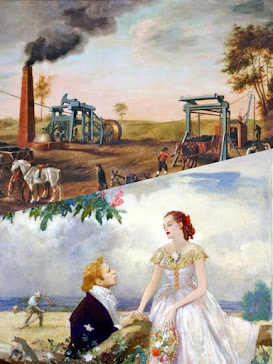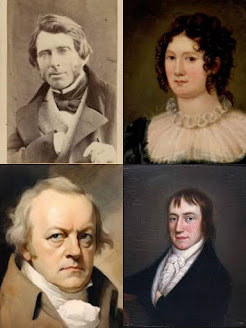Assignment 105A : Impact of Industrial Revolution on Romantic Age
This blog is part of an assignment for the Paper 105A - History of English Literature – From 1350 to 1900, Sem - 1, 2023.
Impact of Industrial Revolution on Romantic Age
Table of Contents:-
Personal Information
Assignment Details
Abstract
Keywords
Introduction
Historical Context
Impact on Society and Culture
Technology and Imagination
Literary and Artistic Responses
Conclusion
References
Personal Information:-
Name:- Darshan Vagh
Batch:- M.A. Sem 1 (2023-2025)
Enrollment Number:- 5108230045
E-mail Address:- darshanvaghc56@gmail.com
Roll Number:- 6
Assignment Details:-
Topic:- Impact of Industrial Revolution on Romantic Age
Paper & subject code:- 105A - History of English Literature – From 1350 to 1900
Submitted to:- Smt. Sujata Binoy Gardi, Department of English, MKBU,
Bhavnagar
Date of Submission:- 01 December,2023
Abstract
This paper explores the intricate relationship between the Industrial Revolution and the Romantic Age, two crucial epochs that profoundly shaped cultural and intellectual landscapes. The Industrial Revolution, characterized by technological advancements and urbanization, restructured societies and disrupted the delicate balance between humanity and nature. Simultaneously, the Romantic Age responded by championing individualism, celebrating nature, and critiquing unchecked progress. This investigation assesses the enduring impact of these eras on culture and ideas, with a focus on their influence on societal structures, technology, imagination, and artistic expressions. The Romantics, through literature and art, provided profound insights into the emotional and philosophical dimensions of existence in a world swiftly transformed by machinery. The tension between progress and romantic ideals echoes with contemporary audiences, emphasizing the enduring significance of these historical periods.
Keywords
Artistic response, Cultural impact, Emotional dimensions, Industrial Revolution, Intellectual landscape, Individualism, Nature, Progress, Societal structures, Societal transformation, Technology.
Introduction
The Industrial Revolution and the Romantic Age were two important times in history. The Industrial Revolution changed how things were made and where people lived. Factories became common, and cities grew quickly. At the same time, the Romantic Age was all about feelings, nature, and being unique.
This assignment delves into how these periods influenced culture and thinking. The Industrial Revolution brought new technology, but it also made some people miss the simple, natural way of life. The Romantic Age responded to this by appreciating nature and deep emotions.
Together, these times shaped how people thought and what they valued. The clash between progress and romantic ideas influenced art, books, and how people saw themselves in a changing world. This exploration will help us understand the lasting impact of these periods on culture and ideas.
Historical Context
The Industrial Revolution significantly altered the relationship between humanity and nature. In the pre-industrial era, life was intimately connected to the land, and craftsmanship relied on simple tools. However, with the advent of the Industrial Revolution, the introduction of machines and factories brought about a profound shift. While production increased, it also marked a departure from the harmonious coexistence with nature, as expansive factories and burgeoning cities encroached upon natural landscapes.
Turning to the Romantic response to industrialization, a notable concern emerged among poets and thinkers of that era regarding environmental degradation. The growth of factories and urbanization raised apprehensions about the impact on the natural world. Romantic figures expressed these concerns eloquently through their writings, highlighting the consequences of deforestation, pollution of rivers, and the transformation of once-beautiful landscapes.
These poets and thinkers used their literary works to emphasize the intrinsic value of nature, reflecting on the simplicity of life before the industrial era and underscoring how rapid industrialization posed a threat to the environment. Their writings served as a poignant reminder to appreciate and safeguard the natural world amid the relentless march of progress.
The Industrial Revolution reshaped humanity's connection with nature, introducing both progress and environmental challenges. The Romantics, with their deep appreciation for the beauty of the natural world, played a crucial role in articulating the concerns surrounding environmental degradation during this transformative period.
Impact on Society and Culture
The Industrial Revolution ushered in significant societal changes that touched various aspects of life. Urbanization, a key feature, saw the rapid growth of cities fueled by the concentration of industries. This shift from agrarian to urban living not only altered the physical landscape but also transformed the social fabric. Cities became hubs of industry, commerce, and cultural exchange.
Another noteworthy change was the rise of the working class. The shift from manual craftsmanship to factory-based production led to the emergence of a new group of industrial workers. These individuals, often subjected to challenging working conditions, became a crucial force in the changing economic landscape.
Social structures also experienced upheaval. The traditional hierarchies based on landownership and aristocracy underwent transformation, with economic prowess gaining prominence. The Industrial Revolution disrupted longstanding norms, fostering a more dynamic and fluid societal structure.
Amidst these changes, Romantic thinkers offered a distinctive response. They were keenly attuned to the impact of industrialization on individuals and communities. The emphasis on individualism, a core theme in Romantic thought, became a counterpoint to the collective nature of factory work. Romantics celebrated the uniqueness of each person and their capacity for creativity and emotion in the face of the industrial machinery.
Additionally, Romantic thinkers were advocates for social justice. They expressed concerns about the exploitation and harsh conditions faced by the working class. Poets and intellectuals like William Blake and William Wordsworth, for instance, used their works to highlight the human cost of industrial progress.
Furthermore, Romantics reflected on the impact of industrialization on communities. The close-knit, rural communities were disrupted as people moved to cities for work. This shift prompted Romantic thinkers to contemplate the sense of belonging and community bonds that were being eroded by the relentless march of industrial progress.
The Industrial Revolution brought about profound changes in society and culture. Romantic thinkers responded by championing individualism, addressing social injustices, and contemplating the effects of industrialization on the fabric of communities. Through their reflections, they played a crucial role in shaping the narrative around the human experience in the midst of rapid societal transformation.
Technology and Imagination
The Industrial Revolution marked a significant shift in how things were made, with technology playing a central role in this transformation. The introduction of machinery and factory production revolutionized industries, increasing efficiency and output. However, this technological surge also had profound implications for the human imagination.
In the context of the Industrial Revolution, technology altered the way people perceived the world around them. The once-familiar landscapes of rural life were transformed by the presence of factories and machines, challenging traditional ways of living. The rapid pace of technological change prompted individuals to reimagine their roles in this evolving environment. The mechanization of labor and the rise of industry reshaped not only the physical landscape but also the mental landscape, influencing how people envisioned their place in this new era.
Romantic writers and artists, in response to these technological advancements, displayed a fascination with the sublime and the supernatural. The sublime, a concept that evokes feelings of awe mixed with fear, became a recurring theme in Romantic works. The colossal scale of industrial machinery and the profound changes in the natural world prompted Romantics to explore the sublime as a way to grapple with the awe-inspiring, and at times unsettling, aspects of technological progress.
Romantic thinkers were drawn to the supernatural, often using it as a means to express their concerns and anxieties about the consequences of unchecked technological advancement. The supernatural provided a realm where the imagination could navigate the complexities of industrialization, offering a space for introspection and critique.
Writers like Mary Shelley, with her iconic work "Frankenstein," explored the darker side of technology, raising ethical questions about the creation of life through scientific means. The Romantics, by embracing the sublime and the supernatural, sought to convey the emotional and philosophical dimensions of the technological changes sweeping through society.
The role of technology in the Industrial Revolution had a profound impact on the human imagination. Romantics, responding to these changes, channeled their fascination with the sublime and the supernatural to grapple with the awe-inspiring and sometimes unsettling aspects of technological progress. Through their creative expressions, they captured the emotional and philosophical complexities of living in a world increasingly shaped by machines.
Literary and Artistic Responses
The Romantic Age witnessed a rich array of literary and artistic responses to the Industrial Revolution, capturing the complex emotions and reflections of the time.
In literature, William Blake's collection "Songs of Experience" stands out as a powerful response. His poem "London" vividly depicts the impact of industrialization on society, describing the city as full of "charter'd streets" and "mind-forg'd manacles." Blake expresses concern about the dehumanizing effects of the factories, symbolized by the "dark Satanic Mills," portraying a loss of individuality and creativity in the face of industrial progress.(Blake)
Mary Shelley's "Frankenstein" provides a cautionary tale about the consequences of unchecked technological advancement. Victor Frankenstein's creation of the monster using scientific means serves as a metaphor for the potential dangers of playing with the forces of life and death through machinery. Shelley's work reflects a deep anxiety about the ethical implications of the rapid changes brought about by industrialization.(Shelley)
On the artistic front, J.M.W. Turner's paintings, such as "Rain, Steam, and Speed – The Great Western Railway," offer a visual response to the Industrial Revolution. Turner captures the dynamic and sometimes overwhelming force of industrial progress, portraying a steam engine rushing across a bridge. The painting reflects both the awe and fear associated with technological advancement during this period.(Turner)
In poetry, William Wordsworth's "Lines Composed a Few Miles Above Tintern Abbey" is a significant work that contemplates the impact of industrialization on nature. Wordsworth expresses a concern about the "dreary intercourse of daily life" brought about by urbanization and the encroachment of industrialization on the serene landscape.(Wordsworth)
These works collectively convey the Romantic response to the Industrial Revolution. The themes of nature, individualism, and the consequences of technological progress are recurrent. Romantic poets, novelists, and artists grappled with the emotional and philosophical dimensions of living in a world rapidly transformed by machinery, weaving a tapestry of creative expressions that continue to resonate with contemporary audiences. Through their works, they provided a nuanced commentary on the profound changes and challenges of the time.
Conclusion
The Industrial Revolution stirred big changes, and the Romantics had a lot to say about it. They didn't just talk about machines; they shared feelings about nature, worried about how technology changed things, and even told stories about it. The impact of the Industrial Revolution on Romantic thinking is still felt today. The Romantics celebrated nature's beauty, questioned the consequences of machines, and expressed concerns about society. Their creative works, like poems and paintings, are like windows into a time when people grappled with a world rapidly changing. The Romantic Age leaves us with lasting insights into the human experience amidst progress.
References
Blake, William. "London." Songs of Experience, 1794.
Cloudsley, Tim. "Romanticism and the industrial revolution in Britain." History of European Ideas 12.5 (1990): 611-635.
Qureshi, Sofia Sadique. "Importance of Romantic Period in Modern Day English."
Shelley, Mary. Frankenstein. Penguin Books, 1818.
Sultana, Afreen. Industrial revolution in literary imagination responses from three phases: the romantic, the victorian and the late victorian period. Diss. BRAC University, 2016.
Turner, J.M.W. "Rain, Steam, and Speed – The Great Western Railway." 1844.
Wordsworth, William. "Lines Composed a Few Miles Above Tintern Abbey." Lyrical Ballads, 1798.
Woudstra, J. Poetry, Nature and Self-A Quest for Happiness and Acknowledgement during the Romantic Age. MS thesis. 2012.
Words : 1905
Image : 2




Comments
Post a Comment